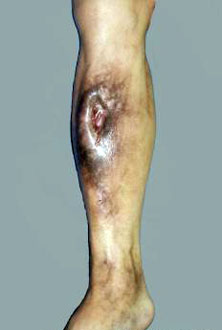
Introduction to
Osteomyelitis
Osteomyelitis is inflammation of the bone caused by an infecting organism. Although bone is normally resistant to bacterial colonization, events such as trauma, surgery, the presence of foreign bodies, or the placement of prostheses may disrupt bony integrity and lead to the onset of bone infection. Osteomyelitis can also result from hematogenous spread after bacteremia. When prosthetic joints are associated with infection, microorganisms typically grow in biofilm, which protects bacteria from antimicrobial treatment and the host immune response.
Early and specific treatment is important in osteomyelitis, and identification of the causative microorganisms is essential for antibiotic therapy. The major cause of bone infections is Staphylococcus aureus. Infections with an open fracture or associated with joint prostheses and trauma often must be treated with a combination of antimicrobial agents and surgery. When biofilm microorganisms are involved, as in joint prostheses, a combination of rifampin with other antibiotics might be necessary for treatment.